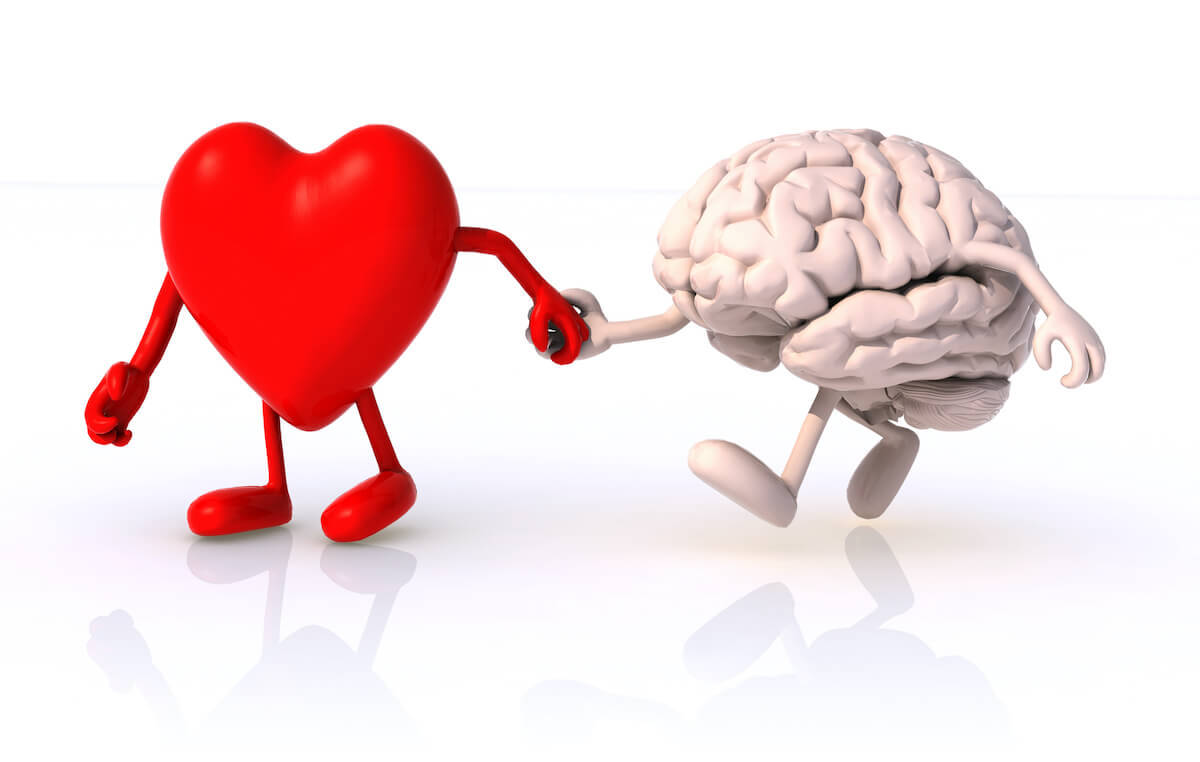You might think feeling sad would be the defining characteristic of depression. Not so. There's one that's even more predominate.
In fact, believe it or not, you can suffer from depression and not even feel sad!

Author, Dr. Susan LaCombe is a 20-year veteran Psychologist and a passionate advocate for maximizing the autonomic nervous system for getting rid of anxiety and depression.

Signs of depression
Here are some examples of what I hear from clients who feel depressed. If you notice these signs of depression within yourself, it might be wise to connect with a good psychotherapist.1
No one should suffer needlessly!
Flat mood:
"I feel that something is missing. Nothing is wrong. But why does everything feel blah?"
"I sit around and watch television all day. I don't feel like doing anything."
"I wonder what it's all about. Life doesn't have meaning."
"I cry at the drop of a hat."
"I can't cry"
Low energy:
"I'm so tired. My body feels heavy. It's a chore to do a few dishes."
"Sometimes my hand shakes so much, others can see it."
Sleep Problems:
"I just want to sleep."
"I wake at 3 AM and can't get back to sleep and to make matters worse I sleep off and on all day long." (The usual retort from well-meaning friends is to suggest that they don't sleep during the day.)
"I can't get to sleep. I keep staying up later and later, which makes matters worse.
"Nightmares. I get the wierdest nightmares."
Irritability
"I get irritated over the littlest things these days. This isn't like me...well at least, not this much."
"I flip out over things that aren't even important and then I feel like a jerk afterwards."
Difficulties with Concentration
"I can't remember anything."
"If I was back in school, there'd be no way I could study like I did. I can't even read a magazine article all the way through."
"I can't make a decision these days. I labor over and over again on the smallest of things and then I'll make this impulsive decision on something big. Go figure."
Physical Problems
"My lower back is constantly aching."
"I get the wierdest pains. One day they're there and the next they're gone."
Erratic Eating:
"I just want to eat and eat. I know I"m eating for comfort but it's often too hard to stop."
"I can't stomach the idea of food. It makes me nauseous to think of it."
Sex
"Sex! It's not in the picture."
Issues Related to Self-Esteem
"I don't want to bother them with my silly concerns."
"I can't see asking for help; I'm not sure even how I would go about doing that."
"I hate myself".
"I used to be so confident. I would never get uptight about speaking in a group."
Withdrawing from Others
"I don't like to commit too far into the future cause I can never tell what mood I'll be in."
"I just want to be alone".
"I'm not into hanging out anymore. I don't mind meeting a friend here and there. Funny thing is, I feel so lonely."
"I can't answer the phone. I only listen to the messages. And, I sometimes don't return the calls."
"I'd be fine if everyone would just stop bugging me."
Can't leave the past alone
"I can't imagine even winning the lotto would make me feel better" they might say.
"I can't get over things that happened to me in the past. I think about them over and over again."
Lack of motivation and interest in things
"I used to love playing the piano and now it just sits there - a useless piece of the furniture."
"I have to reward myself just to get a bit of work done."
"Yeah, it's weird. I have no interest in doing anything anymore."
Easily overwhelmed
"I'll have to save myself up for tomorrow cause I have a doctor's appointment."
"No thanks, sounds like a nice get together - and I know I keep saying that - I just can't handle a group anymore.
"I'm getting behind in everything."
Feeling "bummed out" or are you depressed?
Maybe you've had a similar experience. I was walking along a city street and I saw a guy sitting on the hood of a car talking to his buddy.
Who hasn't heard this kind of statement by a friend, family member or even a stranger?
You could imagine how I took that... being a psychologist and all. But actually, in the same way as I hear "I'm going crazy", I realize these remarks are part of our everyday language.
When we hear a remark like this and in this context, we assume the guy is unhappy or bummed out about something. One could imagine for instance, that he ran into a problem that temporarily seems insurmountable...just banged up the new car, or lost a job, a girlfriend, or lost out on something that was eagerly anticipated.
We interpret it as an immediate reaction to..."sh - t happens!".
We sometimes use the word "depressed" to add emphasis to our current mood. It's easy to get this state confused with what's known as "clinical depression". Clinical depression is not necessarily triggered by a single event. This isn't to say that something bad could have happened which did trigger the depression, it's just that a single precipitating factor isn't necessary.
The point is that with clinical depression this "bummed out" state isn't temporary. It goes on for weeks, often months and even years, and feels as if it will never end.
Probably a good rule of thumb is that it's normal to feel sad when unfortunate things happen. However, when the sadness persists and interferes with your sense of happiness, you may be suffering from depression.
What's the difference between the "bummed out" guy and someone with clinical depression?
It's a matter of severity. In a couple hours the "bummed out" guy is going out to dinner with his friend and they'll chat about what he can do to find another job. He will feel slightly more hopeful and later they'll catch a movie.
By the end of the evening, he'll feel a little lighter. In a couple weeks, he'll feel even better.
The difference is that this guy has resilience in his nervous system. He can bounce back.
Someone who is less resilient might take months to completely recover; another person might take years.
Ordinarily, an individual suffering from clinical depression takes a long time to recover from the stress and challenges of life.
Many people who suffer from depression experience a flat mood: there's no coming up for air, there's never a break. They feel heavy in their body. There's no energy. No good feelings. No excitement.
And for the most part, "no hope".
Feeling hopeless
The feeling of hopelessness is persistent. It can feel that this frame of mind will be here forever.
The reason for this is that we cannot easily imagine a different state and subsequently feel it in our body. For instance, it's hard to re-experience the sore achy muscles we usually get with the flu.
Moments of resilience when they feel lighter are fewer and less remarkable. In fact, because there is less resilience in the nervous system they can't sustain positive feelings even when good things happen! (An important fact when recovering from depression.)
Research on depression is a mixed bag
The research shows that counseling can be very helpful for depression however the results are mixed. Not everyone improves.
Don't be discouraged though. I'm quite optimistic about the future treatment for depression.
In my view, the reason for these mixed results is that most of this research was based on left brain treatment models (eg. changing cognitions) when a newer perspective is that depression is more of nervous system problem best treated by right brain brain strategies.
Not only that, in many of these studies there was no accounting for how severe the depression might be. The more severe, the more it's necessary to receive "attuned" care.
Here's what I mean . . .
With increased severity, you need treatment that "matches" where you are in the moment.
For example, when your depression is less severe and your doctor encourages you to get for a walk in nature - you'll give that a try.
And hey, you feel better!
However, if your depression is more severe and your doctor makes the same suggestion, you'll find it very hard to get out. You end up blaming yourself for not doing it believing you're lazy and just don't want to get better!
And in fact, now that you're badgering yourself, you feel even worse! 🙁
When in actual fact, you're way too depleted to undertake such a task. Just getting out of the house is a chore. Your body actually wants to curl up in bed with the covers all around.
In other words, if you have a "right-brain" problem, use a "right-brain" approach.
Body psychotherapy for instance, is based on tracking body sensations. And noticing body sensations is a right brain-based activity.
Depression symptoms are on a continuum
Depression symptoms are best understood if you think of them on a continuum from mild to severe. And when you see depression as an extreme form of "numbing" you'll better appreciate how the symptoms are related.
For example, if your depression is mild there would be a greater probability that you would also feel anxiety (e.g. anxious or restless).
If your depression is severe you might not even feel anxiety because you are so numb you can't feel anything . . . which of course, is the main problem.
When does "down in the dumps" become clinical depression?
For years this wasn't an easy question to answer for many health professionals.
From a neurobiological perspective, there is no single moment when the symptoms in the brain suddenly transform and proclaim: "You've got depression".
This diagnostic point was arrived at through an agreement among experienced health professionals who decided what constellation of symptoms constituted different degrees of depression. They put their decisions in a book called the DSM, a diagnostic manual that "defines" clinical depression and other mental health problems.
This lack of clarity for identifying when someone is suffering from depression can sometimes make diagnosis a tricky matter. It's also the reason why many people who have depression suffer needlessly without being aware of their condition.
Where a "diagnosis" for depression is handy
Any one of the symptoms described above is reason enough to seek psychotherapy. In other words you don't need a certain minimum number of symptoms to qualify yourself for psychotherapy.
However, for the purpose of covering treatment costs (e.g. health insurance coverage) and deciding who "requires" it and who does not, a "diagnosis" is necessary. This diagnosis is based on a predetermined list of symptoms which must be present for you to be "officially" clinically depressed.
Terms such as Major Depression, Dysthymia, or Adjustment Disorder are examples of clinical depression diagnoses.
These diagnostic labels are often useful for clinicians when they are consulting with each other. And, from the client's point of view it can be reassuring to know that their condition is recognized, that they "have" something and that it's real, not just in their imagination.
However, there are some flaws in this approach. First, what happens if your symptoms don't nicely fit the official criteria; are you supposed to suddenly not be depressed? What about your insurance coverage?
The use of diagnostic labels can also have adverse therapeutic consequences. For example, although it may be comforting to know that our weird symptoms are a "recognized condition", for some people such labelling can lead them to feel powerless, as if they had an incurable disease.
A psychophysiological approach to the signs of depression
What you may find interesting is that a clinically depressed state is sometimes different from being unhappy. We don't need to feel unhappy to be depressed.
In fact, not all depressed people feel sad. Of course, they might be apt to feel sad or disappointed that they can't get out of bed in the morning, but they don't report feeling sad about anything in particular.
This has confused many a client when they hear the news that their tiredness is not caused by a virus, but from depression.
If you understand the causes of depression from a psychophysiological perspective, you'll appreciate why fatigue is the defining symptom in depression.
The above signs of depression might seem unrelated to each other. However, from a psychophysiological perspective, they're all connected. And from within this model, they're better understood.
To learn more about the psychophysiology of depression, check out the next article.
Notes
1Keep in mind that medical conditions may exacerbate or even cause symptoms of depression. These are tests that your physician may do: thyroid functions, electrolyte imbalances, creatinine and liver function tests. Your physician may also do a complete blood count and/ or a comprehensive chemistry panel.
References
Porges, Stephen, (1995). Orienting in a defensive world: Mammalian modification of our eveolutionary heritage. A polyvagal theory. Psychophysiology, 32, 301-318.
Dr. Stephen Porges' identified two - not one - branch of the parasympathetic nervous system. His discovery of the dorsal vagal and ventral vagal has helped us to understand how the experience of depression develops. The polyvagal theory has also been useful in understanding the mind body connection. You can access his classic 1995 article below (you will be taken off site):
Orienting in a Defensive World...A Polyvagal Theory.
Rothschild, Babette, (2000) The Body Remembers: The Psychophysiology of Trauma and Trauma Treatment, London: W. W. Norto & Company.
Scaer, Robert, (2005). The Trauma Spectrum: Hidden Wounds and Human Resiliency. New York: W.W. Norton & Company.
A nervous system that has moved into dorsal is not running at its' full potential. The reason being is that much of the energy is being devoted to containing the churned up energy underneath. This leaves less energy for more expansive states like joy and laughter.
Although she does not call it as such, Roz Carroll M.A. of Britain was describing the dorsal state in her well-known Conference lecture series at the Chiron Center in March 2001. Here is an electronic version of her lecture (you will be taken off site):
Autonomic Nervous System: Internal Barometer of Emotional Intensity and Internal Conflict
Related articles
How to deal with Depression
Depression and Being Tearful


